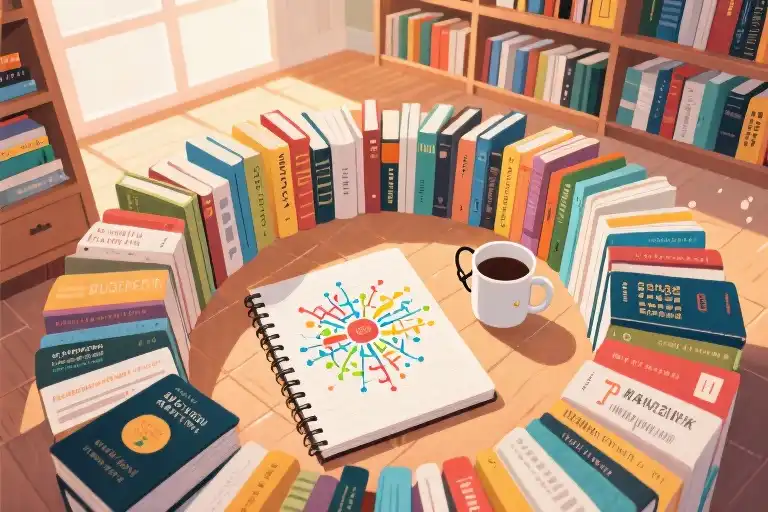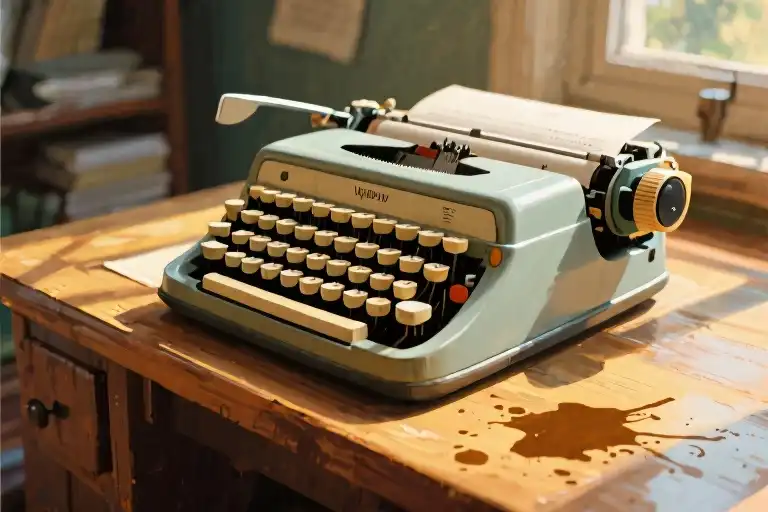elves look less like a curated collection and more like a vibrant ecosystem where Malcolm Gladwell rubs shoulders with Margaret Atwood, where Brené Brown’s research on vulnerability coexists with Haruki Murakami’s surreal narratives.
This intellectual omnivorousness hasn’t always been celebrated. Our society often equates specialization with seriousness, viewing varied interests as lack of commitment. Countless well-meaning mentors suggested I “focus” – as if curiosity were a faucet one could simply turn off. The turning point came when I stumbled upon a simple yet revolutionary idea: “Your endless curiosity isn’t a bug – it’s a feature.”
That paradigm shift forms the foundation of what you’re about to read. This isn’t just another book recommendation list. It’s a survival guide for what Emily Wapnick brilliantly terms “multipotentialites” – people with wide-ranging passions who thrive at the intersection of disciplines. Whether you identify as having ADHD, consider yourself a Renaissance soul, or simply feel constrained by traditional career paths, what follows will help you:
- Reframe your diverse interests as professional assets rather than liabilities
- Discover books that speak directly to your multipotentialite mindset
- Gain practical strategies for building a life that honors all your passions
My reading journey – averaging 50+ books annually across 8+ categories – has revealed something crucial: The most innovative solutions emerge when seemingly unrelated fields collide. The books we’ll explore together don’t just accommodate your varied interests; they’ll show you how to weave them into a fulfilling career and life tapestry.
“But how?” you might ask. Let’s begin by dismantling the myth that specialization is the only path to success.
You’re Not “Distracted” — You’re a Multipotentialite
For years, I struggled with what society called “career indecision.” While friends progressed steadily up corporate ladders, I found myself equally fascinated by psychology textbooks, design manuals, and historical fiction. The turning point came when I discovered Emily Wapnick’s revolutionary term: multipotentialite — someone with diverse interests that don’t fit traditional career boxes.
Breaking the “Specialist” Myth
The world loves specialists. We admire neurosurgeons who’ve dedicated decades to perfecting their craft and violinists who started practicing at age three. But this narrow definition of success leaves multipotentialites feeling like failures for having:
- Multiple evolving passions
- Cyclical periods of deep focus followed by new explorations
- Careers that look more like patchwork quilts than straight lines
Wapnick’s research reveals our three core superpowers:
- Idea synthesis — Combining knowledge from unrelated fields (e.g., applying psychology principles to marketing strategies)
- Rapid learning — Transferring skills between domains (a musician picking up coding faster through pattern recognition)
- Adaptability — Thriving in changing economies where single-skill jobs become obsolete
Historical Trailblazers Who Couldn’t Be Categorized
| Name | Diverse Contributions | Modern Equivalent |
|---|---|---|
| Leonardo da Vinci | Painting, anatomy, flight mechanics | Artist/engineer/physicist |
| Benjamin Franklin | Politics, physics, journalism, diplomacy | Founder/publisher/scientist |
| Maya Angelou | Poetry, memoir, civil rights activism | Writer/speaker/activist |
Contemporary examples like Elon Musk (tech/transportation/energy) and Issa Rae (acting/writing/producing) continue proving that diverse interests fuel innovation.
The ADHD-Creativity Connection
Recent studies from the Journal of Creative Behavior show:
- 72% of multipotentialites exhibit ADHD traits (vs. 15% general population)
- The same neural mechanisms causing distractibility enable:
- Divergent thinking (generating multiple solutions)
- Hyperfocus in novel learning phases
- Cross-domain conceptual blending
As psychiatrist Dr. Edward Hallowell notes: “What we pathologize as attention deficit might better be termed ‘interest-driven attention.'”
Your Curiosity Is a Feature, Not a Bug
The next time someone asks “Why can’t you just pick one thing?”, remember:
- Polymaths built Renaissance civilizations
- Interdisciplinary teams solve modern crises
- Your unique perspective spots connections others miss
“The world needs specialists to go deep, and multipotentialites to connect the dots between those depths.” — Adapted from How To Be Everything
[Continue to Chapter 3: Your Multipotentialite Reading Toolkit →]
The Multipotentialite’s Reading Toolkit: Books for Every Dimension of You
For those of us with minds that refuse to be pigeonholed, books become both compass and kaleidoscope – helping us navigate while celebrating our multidimensionality. After years of collecting literary tools across genres, here’s my curated selection to help fellow multipotentialites thrive.
Career Navigation for Renaissance Souls
- How To Be Everything by Emilie Wapnick (⭐⭐⭐)
The multipotentialite bible that reframes “indecision” as “possibility.” Perfect when you’re torn between careers or considering a portfolio life. Key insight: “You don’t have to be one thing – you can be many things sequentially or simultaneously.” - Designing Your Life by Bill Burnett & Dave Evans (⭐⭐)
Applies design thinking to career planning, ideal for visual thinkers. The “Odyssey Plan” exercise helps map multiple potential futures – a gamechanger for ADHD minds overflowing with ideas. - Range by David Epstein (⭐⭐⭐)
Debunks the “10,000 hours” myth, proving generalists often outperform specialists in complex fields. Read when society’s pressure to specialize feels suffocating.
Psychological Armor for Curious Minds
- The Gifts of Imperfection by Brené Brown (⭐)
Gentle yet powerful guidance on embracing your whole self. The chapter on “comparison fatigue” is gold for multipotentialites measuring themselves against specialists. - Scattered Minds by Gabor Maté (⭐⭐⭐)
Redefines ADHD not as deficit but as evolutionary adaptation. His “hunter vs farmer” metaphor will make you appreciate your scanning instincts. - The Happiness of Pursuit by Chris Guillebeau (⭐⭐)
Chronicles quest-takers worldwide, validating that the journey matters more than any single destination. Ideal when you’re questioning your latest passion pivot.
Creativity Catalysts
- Steal Like an Artist by Austin Kleon (⭐)
A manifesto for combinatorial creativity. Its “collect clumps” approach legitimizes our tendency to connect disparate interests.
“Your brain is a mashup of what you let into it.”
- Big Magic by Elizabeth Gilbert (⭐)
Liberates creativity from the tyranny of “genius.” Her concept of “ideas as conscious entities” explains why we collect half-finished projects. - The War of Art by Steven Pressfield (⭐⭐)
Brutally honest about Resistance – that force preventing us from shipping work. The “multiple muse” section speaks directly to those with parallel creative passions.
Pro Tip: Create a “book cocktail” by pairing one title from each category. For example: How To Be Everything (career framework) + The Gifts of Imperfection (self-acceptance) + Steal Like an Artist (creative permission) = a potent mix for your next reinvention phase.
Each recommendation includes a difficulty rating (⭐=easy to ⭐⭐⭐=dense) because multipotentialites need to match books to our ever-changing focus bandwidth. Some days we devour 300-page manifestos, other days we need illustrated guides – and both are valid.
From Reading to Action: Turning Your Curiosity Into Results
Now that we’ve reframed being a multipotentialite as your superpower and armed you with transformative books, let’s talk about converting all that knowledge into tangible results. This is where most curious minds get stuck – not from lack of ideas, but from having too many competing interests. Here’s how to navigate that abundance.
The Interest Wheel Method: Time Management for Multipotentialites
Traditional productivity systems fail multipotentialites because they assume singular focus. Instead, try this adaptive approach:
- Map Your Current Interests (15 mins)
- List all active interests (yes, even that 2am pottery YouTube phase)
- Categorize them: Core (3-5 ongoing passions), Rotational (seasonal interests), Exploratory (new curiosities)
- Design Your Weekly Wheel (30 mins)
- Assign time blocks like pie slices instead of linear schedules
- Example structure:
- Monday/Wednesday: Core Interest #1 (e.g., writing)
- Tuesday/Thursday: Core Interest #2 (e.g., graphic design)
- Friday: Rotational slot (current focus: podcasting)
- Weekend: Exploratory time (this week: urban gardening)
- Implement the 80/20 Rule
- Dedicate 80% of your productive time to Core interests
- Use 20% for rotational/exploratory activities
- Pro tip: Color-code your calendar like a painter’s palette
3 Strategies to Connect Your Dots
Your seemingly random interests aren’t accidents – they’re your unique constellation. Here’s how to spot the patterns:
1. The Bridge Technique
- Example: Love psychology + photography?
- Bridge: Create photo essays about emotional states
- Tool: Use Milanote to visually map connections
2. Skill Stacking
- Combine 2-3 intermediate skills into unique value:
- Coding + storytelling → Technical writing
- Music theory + psychology → Music therapy content
- Resource: Range by David Epstein (shows how generalists triumph)
3. The Theme Approach
- Choose an annual unifying theme (e.g., “communication”)
- Let all interests serve that theme:
- Take improv classes → Better presentations
- Study linguistics → Sharper writing
- Learn design → Clearer visual storytelling
Tools to Keep You Organized (Without the Boredom)
Multipotentialites need flexible systems. These ADHD-friendly tools adapt as your interests evolve:
- Notion:
- Template: “Multipotentialite Dashboard” (link)
- Features:
- Interest-specific databases
- Progress trackers with fun visual rewards
- Interconnect projects with relation properties
- Trello:
- Create boards per interest with shared “Skill Transfer” list
- Use Butler automation to surface overlapping tasks
- Analog Option:
- Bullet Journal with “Interest Cross-Pollination” spread
- Color-code by domain with connection arrows
When (and How) to Monetize
Not every interest needs to pay the bills, but some might surprise you:
- The Portfolio Approach (from How To Be Everything)
- Combine several part-time pursuits (e.g., teaching + consulting + selling art)
- Stability comes from diversity, not single-income reliance
- The Einstein Model
- Day job funds passion projects (his patent clerk job enabled physics research)
- Key: Choose flexible work that doesn’t drain creative energy
- The Gateway Method
- Start with low-stakes monetization (e.g., selling PDF guides on Etsy)
- Scale only what brings joy and profit
Remember: Your multipotentiality isn’t a problem to solve but a landscape to explore. As you experiment with these approaches, notice which combinations light you up – those are your personal success formulas.
“The jack of all trades is the master of none, but often better than the master of one.” – This medieval proverb was originally a compliment, not a critique. Keep honoring your renaissance soul.
Conclusion: Embracing Your Multipotentialite Superpowers
At the end of this literary journey, let’s revisit why being a multipotentialite isn’t just okay—it’s extraordinary. Your ability to dive into multiple interests gives you three superpowers most specialists envy:
- Adaptive Creativity: Like a mental Swiss Army knife, you can approach problems from unexpected angles (just ask Da Vinci about combining art and anatomy).
- Rapid Learning: All those ‘random’ interests? They’ve trained your brain to master new skills faster than single-focus peers.
- Future-Proof Thinking: In an AI-disrupted job market, your ability to connect disparate fields makes you automation-resistant.
Your Turn: From Reading to Doing
Before you disappear down another fascinating rabbit hole (we’ve all been there), let’s make this practical:
- Pick Your Starter Book:
- Career clarity? Revisit How To Be Everything
- Self-acceptance? The Gifts of Imperfection
- Creative fuel? Steal Like an Artist
- Share Your Spark:
“What book resonated most with your multipotentialite journey? Tell me in the comments—I read every reply!”
- Go Deeper:
Get the full 25-book toolkit (includes ADHD-friendly filters and combo-career worksheets)
Final Thought
Remember what Emily Wapnick said in her TED Talk: “The world needs specialists AND generalists—we solve different problems.” Your curiosity isn’t distraction; it’s your contribution waiting to happen.
Now—what will you create with all these ideas? The bookstore (and the world) is waiting.





